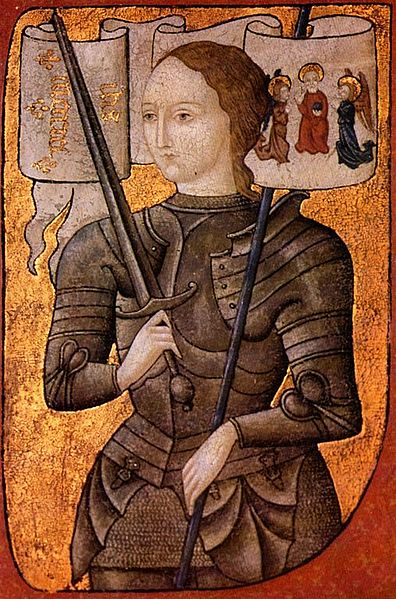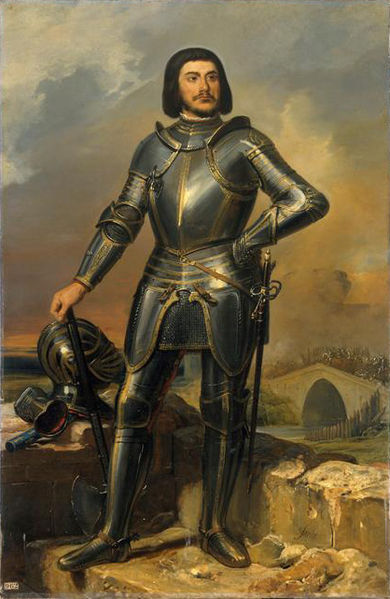January 6: Joan of Arc
Joan of Arc (1412)
It was on this date, January 6, 1412, that Jeanne d'Arc, or Joan of Arc, was born at Domrémy in Champagne, France. Joan grew up on a French farm during the Hundred Years War, the youngest of a family of five, and never learned to write or read. Her story is compelling as drama:
In the summer of 1425, the adolescent Joan began to hear voices and see visions. Three years later, the sixteen-year-old believed she had been given a mission to unite France under the dauphin, later King Charles VII. After persuading Charles's general, Robert Baudricourt, the king allowed Joan to defeat the English at Orléans. Charles was crowned at Rheims (17 July 1429), which Joan also helped to liberate, but in May 1430 Joan was captured while defending Compiègne against the Duke of Burgundy (an English ally), abandoned by Charles, sold to the English, and found guilty of heresy by the Inquisition. Joan was burned at the stake as a witch 31 May 1431, at age 19.
Whether Joan's leadership was causative of, or merely coincidental with, French victory, it must be remembered that in every battle they won, the French had superior forces and abler commanders. The basic questions that concern us about Joan are (1) Did she really hear voices? and (2) Was she a witch?
(1) No one but Joan said she heard the voices. She admitted them to no one until her trial. There is no knowing how much of the detail she supplied — such as the visions of St. Michael, St. Margaret, St. Catherine, and others — or she added later or she believed originally. By all accounts, Joan was a pious child, and ascetic in the extreme. That, along with her adolescent hormones, could have chemically induced mystical experiences, but this is mere speculation. While it is impossible to prove that angels did not visit Joan, it is quite a bit more likely that she was the victim of delusions or schizophrenia.
(2) One player rarely mentioned in the drama of Joan of Arc is Gilles de Laval, Baron de Rais, known as Marshall Gilles de Rais (1404-1440). Aside from being the wealthiest man in France, who helped to finance the French against the English (and eight years older), Gille's biography is similar to Joan's: he was exceedingly pious, prayerful and longed to be a priest; he was a superb soldier and military strategist; he fought alongside Joan at Orléans and Rheims and attended the coronation of Charles VII; and he was at Joan's side, but abandoned her, when she was captured.
Gilles lived beyond even his considerable means and turned to alchemy and, perhaps, to Satanism, to restore his wealth. Seeing himself as an Emperor Caligula on his domains, when poor children came begging for food at his castles, he sexually abused and then murdered them. Finally arrested for attacking a priest, under torture Gilles admitted his addiction to serial killing, alchemy and black magic, with the testimony of witnesses, including servants, also tortured.
Margaret Murray's speculations on Joan and witchcraft* are no longer considered respectable, but the old religion was indeed practiced in Europe in Joan's time. It is at least possible that, if Gilles was a practitioner, Joan was no stranger to the superstition. Joan was executed for being a witch, and the transcripts of her trial show her accusers had some evidence of this. Whether supernatural or popular, the English feared her power. Joan's rehabilitation 24 years later (after the Hundred Years War had ended), primarily helped Charles, who otherwise would have been seen as enthroned with the help of a heretic and witch. Since those who believed Joan a witch and those who believed her a messenger of God subscribed to the same superstitions, it is of little consequence whose side is right.
* Margaret Murray, The Witch-Cult in Central Europe (1921) and The God of the Witches (1933). Murray would say that Joan's visions were chemically induced, but there is scant evidence that Joan ingested any psychoactive drugs or was actually a member of any cult that used such substances.
Originally published January 2004.



